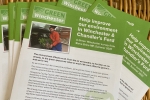
Steve Brine has warmly welcomed news that the Environment Secretary, Michael Gove, has pledged action to reduce plastic waste choking our oceans as he set out his ambition for the UK to lead the world in environmental protection.
Around eight million tonnes of plastic makes its way into oceans each year, posing a serious threat to our natural and marine environment. Experts estimate plastic is ingested by 31 species of marine mammals and over 100 species of sea birds.
More than nine billion fewer plastic bags were used since the government introduced a 5p charge, an 83% reduction, and the Environment Secretary has set out further plans to prevent other sources of plastic finding their way into our oceans and seas during a speech entitled 'Delivering a Green Brexit' today.
Mr Gove confirmed that legislation will be introduced this year to ban the sale and manufacture of microbeads – tiny pieces of plastic that are easily swallowed by marine life – in cosmetics and personal care products such as toothpastes and shower gels.
Speaking at WWF UK on Friday morning, Environment Secretary Michael Gove said: "Eight million tonnes of plastic are discarded into the world's oceans each year, putting marine wildlife under serious threat.
"In October 2015, the government introduced the 5p carrier bag charge. Figures released today show that policy's enormous success – nine billion fewer carrier bags distributed since the charge was introduced, a fall of 83%. More than £95million raised from the charge has been donated to environmental, educational and other good causes.
"Last year the government launched a consultation on banning microbeads in personal care products, which have such a devastating effect on marine life. We are responding to that consultation today and we will introduce legislation to implement that ban later this year.
"But there is more we can do to protect our oceans, so we will explore new methods of reducing the amount of plastic - in particular plastic bottles - entering our seas, improve incentives for reducing waste and litter, and review the penalties available to deal with polluters - all part of a renewed strategy on waste and resources that looks ahead to opportunities outside the EU."
An expert group announced as part of the government's Litter Strategy has now begun work to explore ways to reduce the use of commonly littered items such as drink bottles, as well as considering the advantages and disadvantages of different types of deposit and reward and return schemes.
Steve Brine said: "This is fantastic news, and we have seen from the plastic bag charge how we can really change things. Awareness of plastic in our oceans has been growing hugely over the past years, and I very much look forward to seeing the legislation before us in the House."
The government is also bringing forward legislation to help councils tackle littering from vehicles and will shortly publish our response to a consultation into increasing the fixed penalty fine for littering.
More information ...

